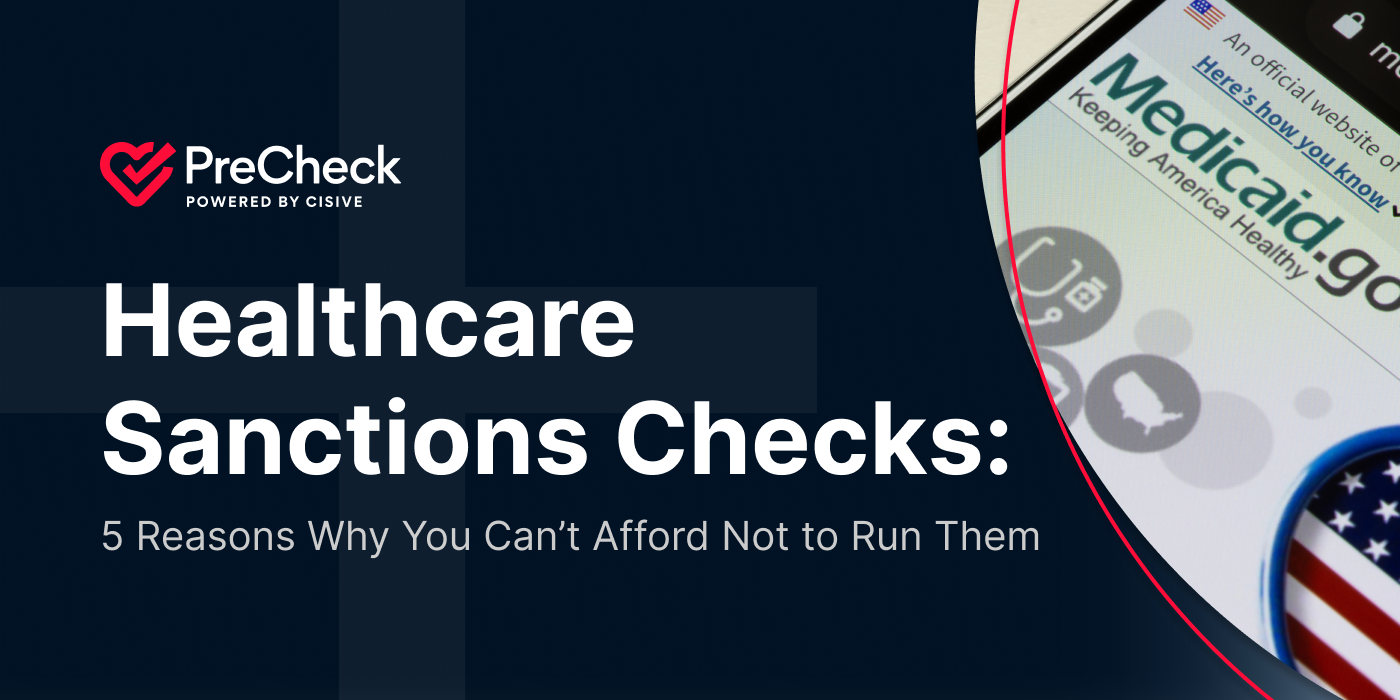
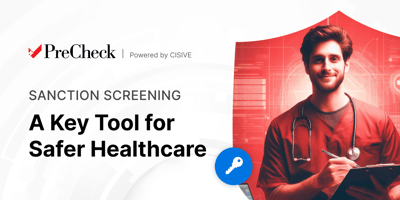
Healthcare organizations are responsible for ensuring they hire trustworthy employees and engage in...

If your organization receives federal funds, you must include sanctions screening as part of your hiring process. But what is a sanctions background check, and how can you possibly fit another task into your day when you're doing interviews, onboarding new hires, and performing other duties?
PreCheck has you covered. Learn more about how partnering with PreCheck can help you stay in compliance without increasing your workload.
Key TakeawaysHere's what you need to know about sanctions checks in healthcare:
|
Table of Contents
A sanctions check is a type of background check used to determine if a potential hire is excluded from participating in federally funded healthcare programs.
As part of its mission, the Office of Inspector General (OIG) fights fraud and abuse within the Medicare and Medicaid systems. The List of Excluded Individuals/Entities (LEIE) contains the names of people and organizations prohibited from receiving payments from federal healthcare programs for any items they sell, prescribe, or order.
Some exclusions are mandatory, while others are up to the discretion of OIG staff. Mandatory exclusions apply to individuals convicted of the following offenses:
Other agencies, such as the General Services Administration, maintain their own lists of excluded individuals and entities. Your background screening process should include checks of these lists.
Recommended Reading: Your Guide to Healthcare Sanctions Background Checks
A healthcare sanctions check is used to ensure you don't hire an excluded individual. The process typically includes the following resources:
Using these resources, the screening company verifies that an individual hasn't faced any suspensions, exclusions, or other professional penalties that would prohibit them from working for your healthcare organization.
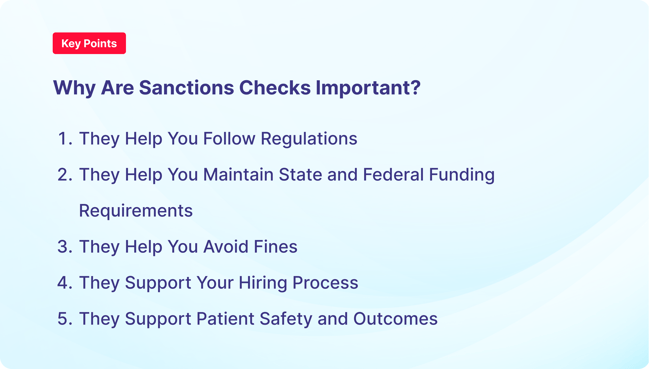
Here are the main benefits of conducting sanction background checks.
Every healthcare organization is subject to state and federal laws governing staffing. Conducting a sanctions check before you hire someone is an excellent way to comply with the requirements.
Individuals on the OIG exclusions list aren't allowed to participate in federally funded healthcare programs. If you don't conduct a healthcare sanctions check, there's no way to know if the person you're hiring is an excluded individual.
Medicare, Medicaid, and other federally funded healthcare programs won't reimburse your organization for any service provided, ordered, or prescribed by an excluded individual. Therefore, sanctions screening may help you avoid unpaid bills.
If you hire or contract with an excluded individual, your organization may be fined as much as $10,000 per item or service. Sanctions screening helps you avoid hiring excluded individuals, so it may also help you avoid steep financial penalties.
When you hire a new employee, you need someone who can provide comprehensive services to patients. An excluded individual can't bill Medicare, Medicaid, or other federally funded healthcare programs, so they can't serve every patient who turns to your organization for help.
Sanctions screening helps you avoid hiring excluded individuals, ensuring that the people you hire can work with your entire patient population.
Sanctions screening isn't just about identifying individuals who committed Medicare fraud or some other type of financial misconduct. The OIG also excludes individuals who have been convicted of patient abuse and neglect.
Your patients deserve to work with competent, compassionate medical professionals. Sanctions screening eliminates excluded individuals from consideration, reducing the risk that a patient will encounter an individual who has been convicted of a violent crime.
Conducting healthcare sanctions checks also contributes to better patient outcomes. When you eliminate unsuitable candidates from consideration, you can focus your efforts on finding the best employees for the job.
Recommended Reading: Sanction Screening: A Key Tool for Safer Healthcare
A sanctions background check reveals important information about a candidate. Here's what you can expect to find.
In a perfect world, every healthcare worker would treat patients with respect and compassion. Unfortunately, some individuals have a history of patient abuse or neglect.
Abuse takes several forms, such as punching, hitting, kicking, and biting. Patient abuse may also be sexual or psychological in nature.
Patient abuse may even take the form of financial exploitation. For example, if a healthcare worker forges a check in the patient's name, they've committed financial abuse.
Neglect typically takes one of two forms in a healthcare setting. The first type of patient neglect is any action that fails to meet objective standards of care.
For example, if a healthcare worker fails to address a patient's hygiene needs, they may be committing neglect.
The second type of neglect is any behavior that would lead a patient or visitor to believe that staff members don't care about their patients. An example of caring neglect is failure to address a patient's concerns.
If an individual has any convictions related to this type of behavior, you'll see them on the results of a sanctions check.
Healthcare workers have access to opiates and other controlled substances, so it's important to hire trustworthy individuals.
If a candidate has any felony convictions related to controlled substances, such as possession with the intent to distribute, those convictions will show up on a healthcare sanctions check.
Financial misconduct takes many forms, such as forgery, embezzlement, and public corruption. Under the OIG guidelines, anyone who is convicted of a felony related to financial misconduct may be placed on the List of Excluded Individuals/Entities.
If the misconduct is related to healthcare, the exclusion is mandatory, not permissive. When you run a sanctions check on a potential hire, you can see whether they have any convictions for financial misconduct.
Conducting this type of check helps you stay in compliance and protect patients from financial exploitation.
Individuals with a history of healthcare fraud aren't permitted to participate in federally funded healthcare programs. This includes individuals who billed Medicare for services never rendered, overcharged Medicaid for services, or prescribed medical equipment for patients who didn't need it.
With a thorough sanctions check, it's possible to uncover healthcare-related fraud convictions, helping your organization avoid the fines and other penalties associated with hiring an excluded individual.
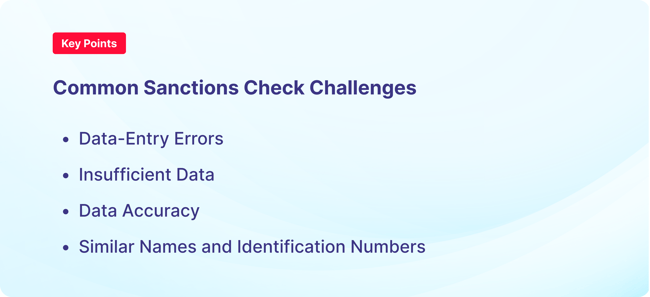
Although healthcare sanctions checks are critical, there are a few challenges you need to know about.
It's easy to make a data-entry error when entering information for a sanctions check. For example, you may transpose two digits in a candidate's Social Security number or spell the name Jamie as Jaime.
Data-entry errors prevent you from getting accurate reports in a timely manner. You may even end up with a report for the wrong person, putting your organization at risk of hiring an excluded individual.
To get an accurate report, you need to provide plenty of information about a potential hire. If you don't have sufficient data, you may not get an accurate result, leaving your organization more vulnerable.
Exclusion lists are updated regularly, so you need access to the most recent information. Otherwise, you could hire someone just before their name gets added to the exclusion list, leaving your organization at risk of fines and other penalties.
Many people have similar names and/or identification numbers, making it more difficult to verify that you're getting a sanctions report on the correct person.
For example, it's possible to mix up Matthew E. Smith with Matthew G. Smith. If you run a sanctions check on the wrong person, you may end up hiring an excluded individual.
Recommended Reading: Your Must-Have Guide to Healthcare Background Check Compliance
Healthcare sanctions background checks are essential for protecting patients and reducing risk for your organization. If you don't screen new hires thoroughly, you may end up hiring someone who can't participate in federally funded programs.
PreCheck has extensive experience with sanctions screening, making it a trusted source for healthcare background checks. Speak to an expert to learn more about how PreCheck can help you meet your regulatory obligations without having to hire additional staff members.

Healthcare organizations are responsible for ensuring they hire trustworthy employees and engage in...

Healthcare sanctions background checks play a vital role in safeguarding patients, protecting...
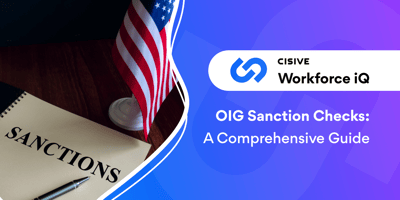
In the complex world of healthcare, OIG sanction checks are non-negotiable. These checks are far...